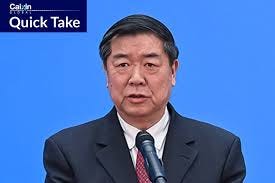Exclusive for my Substack readers: My take on the surprise announcement of upcoming US-China talks over trade and economic issues.
The announcements on Wednesday morning that senior Chinese and US officials are set to hold talks in Switzerland later this week over trade and economic issues came as a surprise to many, but not to readers of this column.
Just two days earlier, on Monday, I boldly predicted that US-China talks regarding trade and tariffs were likely to occur soon. At that time, my unconventional view was met with skepticism from friends and readers, given the intense rhetoric from both Beijing and Washington.


Since US President Donald Trump ignited the global trade war and raised tariffs on Chinese goods to a baseline of 145 percent last month, China has retaliated with a 125 percent tariff on American products.
Statements from Chinese officials and state media suggested that China would "fight to the end" and that negotiations would not commence until the US removed all unreasonable tariffs.
Meanwhile, Trump amplified his claims that the Chinese side was eager to engage and talks were already underway, implying that Beijing blinked first in this high-stakes power game. Yet, until Wednesday, the Chinese government had consistently and categorically denied all of Trump’s assertions that the two sides were engaging in tariff discussions.
Beneath the hyperbole, however, lies a mutual recognition of the need to de-escalate trade tensions between the world’s two largest economies.
As I argued in my previous column, the mounting costs of the conflict necessitate direct talks, despite neither side wanting to yield first.
From a Chinese perspective, the upcoming talks in Switzerland will primarily serve as a fact-finding mission, as Beijing seeks clarity on Trump’s true intentions.
Even before Wednesday’s announcement, there was uncertainty on the Chinese side about who would lead the talks from the US, despite Beijing having long designated Vice Premier He Lifeng as the point man for the discussions.
US Treasury Secretary Scott Bessent, leading the US team along with US Trade Representative Jamieson Greer, is someone with whom the Chinese side would feel comfortable working, given Trump’s cabinet of China hawks.
For full disclosure, my Monday column also suggested that Chinese President Xi Jinping and Trump might engage in a genuine call in the coming weeks to set the tone for the trade talks.
Now, it seems that such a phone call will likely depend on the outcome of the meeting in Switzerland this weekend.
Choosing Switzerland as the venue for the talks is a strategic decision, as neither side wants the meeting to occur in China or the US to avoid showing weakness. There had been speculation that the talks could be held in Singapore, a favored venue for sensitive international issues—such as the 2018 summit between Trump and North Korean leader Kim Jong Un.
From a Chinese perspective, Beijing’s decision to engage in trade talks with the US is part of a sophisticated and strategic power game.
The announcement of talks with the US coincided with Chinese President Xi Jinping’s visit to Moscow for a four-day state visit, during which he will attend Russia’s military parade commemorating the end of World War II and hold talks with Russian President Vladimir Putin.
Meanwhile, the Kremlin announced that President Putin would visit China at the end of August and beginning of September to attend events in Beijing marking the 80th anniversary of the end of World War II, which China refers to as “the War of Resistance against Japanese Aggression.”
China’s efforts to strengthen ties with Russia have emerged amid suggestions by some American analysts that Trump could execute "A Reverse Nixon" to drive a wedge between Russia and China.
The closer bond between Xi and Putin suggests that such theories are little more than delusions.
End.



You did predict the trade talks between China and the US but your closing sentence is a real torpedo to the hopes of many "The closer bond between Xi and Putin suggests that such theories are little more than delusions."
The media here (Australia) are saying that the USA called China first.